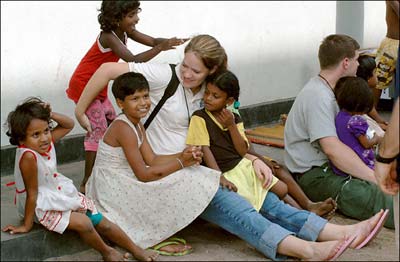In my last post, I reflected on a recent New York Times article that explored the reasons behind the delay of adulthood among todayâs twenty-somethings. I suggested that young people ought to be encouraged to grow up sooner rather than later.
I got an email from my younger brother a day or two later, concerned that I was too narrowly defining adulthood as the achievement of the five traditional markers of adulthood â namely, completing school, leaving home, becoming financially independent, marrying, and having children. What about adults who never do any of these things, he wanted to know? Can we really criticize them for ânot growing up?â
I absolutely agree that defining adulthood this way is problematic for a number of reasons, and was glad that he encouraged me to clarify my thoughts on the issue.
First of all, I think there are many alternative life choices that are just as valuable, if not dramatically more meaningful, than the typical life centered on mortgages, family, and careers.
The celibate life, for example, is a high calling, one which the Apostle Paul holds above marriage (See 1 Cor 7:32-34). Many â if not most â of the worldâs greatest movers and shakers were unmarried. Remaining single allows you much more freedom to focus on bigger issues beyond your spouse and kids, and I deeply respect individuals who choose this challenging and counter-cultural lifestyle.
 Young people who choose to live lives that are not centered on the ownership of property, but instead focus on ministering to others or creating art, are also admirable. Lives like theirs take much more courage and faith to live out than the conventional way of life.
Young people who choose to live lives that are not centered on the ownership of property, but instead focus on ministering to others or creating art, are also admirable. Lives like theirs take much more courage and faith to live out than the conventional way of life.
Then, of course, there are those young people who may want the things typically associated with adulthood â a job, a spouse, a house of their own â but, for whatever reason, canât have them. There are innumerable circumstances which might prevent these things, especially in todayâs economical climate. Plenty of young people would love to get married and move out of the house, but they havenât found the right person or they just canât find employment. Certainly they canât be considered immature for failing to live up to their grandparentsâ ideas of adulthood.
Moreover, plenty unmarried young people who are not homeowners and arenât working at traditional jobs are more mature than many married couples with kids and mortgages. I donât think, then, that these are the best (or at least the only) ways to define adulthood.
Problems with Traditional Views on Adulthood
I have another problem with the traditional understanding of adulthood, though. The thing is, Iâm not completely convinced that those five achievements are things we should really strive for, anyway.
Take marriage. Iâm totally pro-marriage, as you already know, but Iâm also wary of the churchâs intense focus on coupling up, as if getting married is the pinnacle of Christian life. That seems odd for a faith that follows the example of a homeless bachelor. I really think the church could use less emphasis on getting married and having kids and more emphasis on the things that Jesus deeply cared about â like feeding and housing the poor.
Then thereâs home ownership. This wasnât one of the things listed in the New York Times article, but many people feel like they havenât achieved adulthood until they own a house. And Iâm not completely sure we should be so quick to buy homes and bury ourselves in debt. Sometimes I worry that buying a house before we were ready was the most irresponsible thing my husband and I have done so far. Whatâs so grown-up about debt?
Then there are careers. In the last months especially, I have been mulling over whether we should place so much emphasis on finding good-paying jobs â on seeking success, money and prestige â over character, life skills, and deep relationships. Should we, perhaps, focus more on learning to do things for ourselves so that we donât need so much money? With the current rates of unemployment in mind, should we be studying how to survive on much less rather than just working harder to get ânormalâ jobs? Iâm not sure.
If adulthood is primarily about debt and mating, should we really be working so hard to achieve it?
All this being said, though, I still do think that we are a generation that is reluctant to grow up, and I think this is a problem. But I want to explore that a little further in another post.
For now, I want your help.
How do you think we should define adulthood? What are some of the characteristics of a mature person? What kinds of things should an adult be able to accomplish to be considered a grown-up individual?